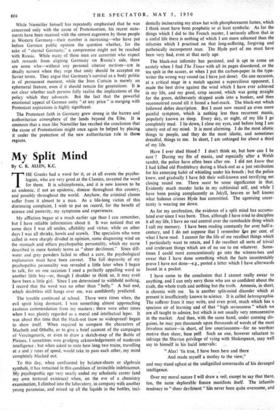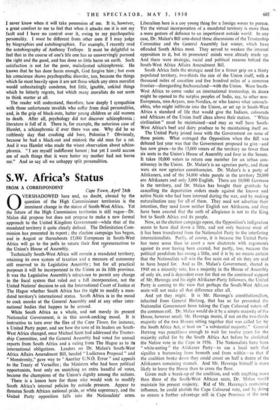My Split Mind
By C. K. ALLEN, K.C.
THE Greeks had a word for it, or at all events the psycho- logists, who are very good at the Classics, invented the word for them. It is schizophrenia, and it is now known to be an endemic, if not an epidemic, disease throughout this country, and possibly throughout the world. Anyhow, the criminal classes suffer from it almost to a man. As a life-long victim of this distressing complaint, I wish to put on record, for the benefit of science and posterity, my symptoms and experiences.
My affliction began at a much earlier age than I can remember, but I have reliable information about it. It was noticed that on some days I was all smiles, affability and virtue, while on other days I was all shrieks, howls and scowls. The specialists who were called in were sharply divided in opinion, some diagnosing wind on the stomach and others psychopathic personality, which my nurse described in more homely terms as " sheer devilment." Since dill- water and grey powders failed to effect a cure, the psychological explanation must have been correct. The full depravity of my psychopathic personality was revealed a little later when I began to talk, for on one occasion I used a perfectly appalling word to another little boy—or, though I shudder to think so, it may even- have been a little girl. Since I am determined to withhold nothing, I record that the word was no other than " belly." A bad end, which doubtless still hangs over me, was confidently predicted.
The trouble continued at school. There were times when, the evil spirit lying dormant, I won something almost approaching cautious commendation from my masters ; there were other times when I was plainly regarded as a moral and intellectual leper. It was about this time that the black-out (now so widespread) began to show itself. When required to compare the characters of Macbeth and Othello, or to give a brief account of the campaigns of Vercingetorix, or even to draw a sketch-map of the Battle of Plataea, I sometimes won grudging acknowledgements of moderate. intelligence ; but when asked to state how long two trains, travelling at x and y rates of speed, would take to pass each other, my mind completely blacked out.
To this day, when confronted by balance-sheets or algebraic symbols, it has remained in this condition of invincible indehiscence. My psychopathic ego very nearly ended my scholastic career (and my own tortured existence) when, on the eve of a chemistry examination, I climbed into the laboratory, in company with another young paranoiac, and mixed up all the liquids in the bottles, inci- dentally incinerating my straw hat with phosphorescent fumes, which I think must have been prophetic or at least symbolic. As for the things which I did to the French master, I seriously affirm that in a sinful life there is nothing of which I am more ashamed than the infamies which I practised on that long-suffering, forgiving and pathetically incompetent man. The Hyde part of me must have been very bad, even at that early age.
The black-out infirmity has persisted, and is apt to come on acutely when I find The Times with all its pages disordered, or the tea spilt in the saucer, or when I put the carbon-paper in the type- writer the wrong way round (as I have just done). On one occasion, at a critical stage in a match against a supercilious opponent, I made the best drive against the wind which I have ever achieved in my life, and my good, crisp second, which was going straight for the green, deliberately skipped aside into a bunker, and then reconnoitred round till it found a heel-mark. The black-out which followed defies description. But I must now record an even more painful symptom, which is nothing less than recurrent mania, popularly known as sleep. Every day, or night, of my life I go completely mad. I lie down, I close my eyes, and before long I am utterly out of my mind. It is most alarming. I do the most idiotic things to people, and they do the most idiotic, and sometimes dreadful, things to me. In short, I am unhinged for about a third of my life.
Have I ever shed blood ? I don't think so, but how can I be sure ? During my fits of mania, and especially after a Welsh rarebit, the police have often been after me. I did not know that I had killed old Pimblebury during a black-out as a just retribution for his annoying habit of whistling under his breath ; but the police knew, and gradually I have felt their well-known and terrifying net closing round me. There must be some significance in that. Evidently much murder lurks in my subliminal self, and while I have been posing complacently as Jekyll, heaven or hell knows what hideous crimes Hyde has committed. The agonising uncer- tainty is wearing me down.
As for my cerebration, the evidence of a split mind has accumu- lated ever since I was born. Thus, although I have tried to discipline it all my life, I have no real control over the ramshackle thing which I call my memory. I have been reading constantly for over half-a- century, and I do not suppose that I remember fwe per cent. of what I have read. I cannot for the life of me recollect things which I particularly want to retain, and I do recollect all sorts of trivial and irrelevant things which are of no use to me whatever. Some- times I could most conscientiously go into the witness-box and swear that I have done something which the facts incontestably prove I have not done—e.g., posted a letter which I have afterwards found in a pocket.
I have come to the conclusion that I cannot really swear to anything, and I can only envy those who are so confident about the truth, the whole truth and nothing but the truth. Amnesia, in short, is chronic with me. So is another split-mind disorder which at present is insufficiently known to science. It is called heterographia. The sufferer from it may write, and even print, much which has a specious air of learning and of that " high seriousness " which we are all taught to admire, but Which is not usually very remunerative in the market. And then, with the same hand, under cunning dis- guises, he may pen thousands upon thousands of words of the most frivolous nature—in short, of low unseriousness—for no worthier motive than sheer, base pelf. Such an one, however reluctant to infringe the Shavian privilege of vying with Shakespeare, may well say to himself in his lucid intervals: " Alas! 'tis true, I have been here and there And made myself a thotley to the view," and may stand aghast at the undignified somersaults of his deranged intelligence. • Over my moral nature I will draw a veil; except to say that there, too, the same deplorable fissure manifests itself. The infantile tendency to " sheer devilnient " lias never been quite overcome, and
I never know when it will take possession of me. It is; however, a great comfort to me to feel that when it attacks me it is not my fault and I have no control over it, owing to my psychopathic personality. I must be different from other men if I may judge by biographies and autobiographies. For example, I recently read the autobiography of Anthony Trollope. It must be delightful to feel that in the course of one's life one has so unswervingly pursued the right and the good, and has done so little harm on earth. Such satisfaction is not for the poor, maladjusted schizophrenic. He knows that he has done harm enough, God forgive him ; but even his conscience shows psychopathic disorder, too, because the things which lie most heavily upon it are not those which any stern moralist would unhesitatingly condemn, but little, ignoble, unkind things which he bitterly regrets, but which many moralists do not seem to think matter at all.
The reader will understand, therefore, how deeply I sympathise with those unfortunate invalids who suffer from dual personalities, ,and, in the grip of black-outs, batter young children or old women to death. After all, psychology did not discover schizophrenia ; literature is full of it. There is, for example, the notorious case of Hamlet, a schizophrenic if ever there was one. Why did he so ruthlessly slay that crashing old bore, Polonius ? Obviously, because he had a black-out and mistook the old man for a rat. And it was Hamlet who Made the wisest observation about schizo- phrenia. "I am myself indifferent honest ; but yet I could accuse me of such things that it were better my mother had not borne me." And so say all we unhappy split personalities.







































 Previous page
Previous page